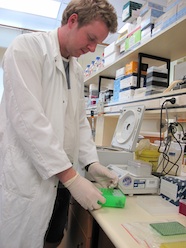- Hereditary Diffuse Gastric Cancer (HDGC) is caused by inherited mutations in the E-cadherin gene (CDH1).
- Mutation carriers have a 56-70% lifetime risk of developing stomach cancer.
- Female carriers have an additional 39-55% risk of developing breast cancer (lobular type).
- It is recommended that mutation carriers have their stomachs removed after the age of about 20-30 years to eliminate further risk. Otherwise, annual endoscopic surveillance is recommended, although this comes with some risk.
- Most people return to largely normal lives 6-12 months after stomach removal (gastrectomy).
- Annual MRIs are recommended for breast cancer surveillance from age 30.
HDGC in New Zealand
- There are over 500 known HDGC families worldwide, with new families being identified each week.
- There are approximately 25 known HDGC families in New Zealand.
- HDGC was first identified in New Zealand in a research partnership between an affected whānau from the Bay of Plenty and the University of Otago.
HDGC Management Guidelines
There is a wealth of information to be found on Diffuse Gastric Cancer specific websites including:
A pamphlet for NZ based patients:
Research into CDH1 at Te Aho Matatū
- Understanding CDH1 mutations and their effects
- Synthetic Lethality as a potential treatment option
- Epigenetic chemoprevention of gastric cancer
Chris Hakkaart selects samples for HDGC study.
CDH1 Discovery
Research into CDH1
- Understanding CDH1 mutations and their effects
- Synthetic Lethality as a potential treatment option
- Epigenetic chemoprevention of gastric cancer
Support CDH1 Research
CDH1 patient resources
- No Stomach for Cancer
- Hereditary Diffuse Cancer.org
- Zane Cohen Centre - What to know when deciding about preventative stomach surgery
- Mummy With No Tummy - blog
- CDH1 gene - blog
- Stan Walker - To Hell and Back, Documentary
Genetic jeopardy
Knowledge of her whakapapa saved Dr Karyn Paringatai's life. Now this experience is inspiring her research.

Related story:
Life saver
